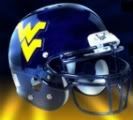Post by elp525 on Oct 2, 2011 21:05:57 GMT -5
October 1, 2011
Freshman rushes for 291 yards in Mountaineers’ 55-10 romp over Bowling Green
By Dave Hickman
The Charleston Gazette
MORGANTOWN - Dustin Garrison swears his most valuable asset as a running back is not his quickness or his speed, his toughness or instincts.
"I think,'' he said without having to think very long, "my strength is my vision."
Still, not even he saw this coming.
Remember all the angst over West Virginia's lack of a running game to take the heat off of a lights-out passing attack? Scratch that, at least for the time being.
Garrison, the little freshman running back who had carried the ball just three times in the first three games before a mild breakout last week against LSU, had an explosion of nearly epic proportions. In fact, West Virginia's 55-10 trouncing of Bowling Green Saturday in the rain and cold of Mountaineer Field was made all the more amazing by Garrison's part in it.
He carried the ball 32 times for 291 yards. In a pass-first offense, he tied Kerry Marbury for the second-most rushing yards in a game in school history. Even more staggering is that his rushing total was just 15 yards shy of the 306 the Mountaineers had gained on the ground in their first four games combined.
Not bad for a guy who was making his first college start and was the third true freshman to fill the tailback spot in West Virginia's first five games. Oh, and doing it in an offense that in the first four games had attained 83 percent of its total offense through the air.
"I never thought about [gaining] 291 yards, but I knew I had to go out and have a great game,'' said Garrison, who during most of the previous four games had been the third option at his position behind Andrew Buie and Vernard Roberts. "I had something to prove, not only to myself, but to Coach [Dana] Holgorsen and [running backs] Coach [Robert] Gillespie.''
Consider it proven.
In leading No. 22 West Virginia (4-1) to its highest rushing total (360 yards) since 2008, Garrison did most of his damage during a first half in which the Mountaineers led 38-10 and at times seemed like something out of the Pat White-Steve Slaton era. The 5-foot-8, 175-pounder had 85 yards in the first quarter and 233 on 24 carries by halftime, which already would have been the sixth-best rushing day in school history.
Holgorsen, while no doubt surprised by the final numbers, refused to admit to being shocked by Garrison's performance, mainly because he'd seen it before.
"If you look at 16 games on his high school film last year, it's like that,'' Holgorsen said. "He's used to 200-yard games. The more you give it to him and the more he plays, the better he gets.''
It's not as if Garrison didn't have any help. While Geno Smith didn't come close to the school-record passing numbers he had a week ago in a loss to No. 1 LSU, he still threw three touchdown passes and completed 18-of-30 passes for 238 yards.
In fact, the downright efficiency with which West Virginia dispensed of Bowling Green after falling behind 10-3 was something to behold. The offense ripped off six straight touchdown drives of between 49 and 90 yards, added a 45-yard Tyler Bitancurt field goal on the next possession and by the middle of the third quarter it was 48-10.
Even after that, when Smith gave way to Paul Millard at quarterback, it didn't stop. Millard immediately led a six-play, 84-yard drive capped by Shawne Alston's second touchdown of the day to make it 55-10.
In the end, West Virginia had 643 yards of total offense, just 31 yards shy of the school record of 673 set in 1923 against Washington & Lee.
West Virginia's defense wasn't too shabby, either. Bowling Green (3-2) gained just 217 yards of offense and had more yards in 10 kickoff returns (258). The Mountaineers also forced five turnovers after having none in three of the first four games. Keith Tandy had two interceptions, Terence Garvin another and the Mountaineers recovered two fumbles and forced three more.
The first of those turnovers came on the opening kickoff.
"That was fun to see on the opening play after we'd been talking all week about not being able to get turnovers,'' Holgorsen said. "Turnovers are a stat that matters. Everyone is aware of that.''
West Virginia's offensive explosion followed a rather precarious start. For the first half of the first quarter, Bowling Green appeared more than ready to make this a forgettable afternoon for the Mountaineers, taking a 10-3 lead.
The Falcons even managed to dominate the opening minutes despite fumbling away the opening kickoff. West Virginia got a field goal out of that for a 3-0 lead, but Bowling Green's Boo Boo Gates returned the ensuing kickoff 77 yards to set up Matt Schilz's 18-yard touchdown pass to Ray Hutson. A long field goal drive then made the score 10-3.
When Smith failed to connect on a third-and-10 play a short time later, it looked like WVU's second straight three-and-out and the beginning of a long day. But Bowling Green was flagged for both pass interference and a personal foul on the play.
Three plays later, Smith hit Ivan McCartney with a 33-yard touchdown and the Mountaineers were off to the races. Smith would later connect with Ryan Nehlen and Brad Starks for scores, and both Garrison and Alston had two rushing touchdowns.
Freshman rushes for 291 yards in Mountaineers’ 55-10 romp over Bowling Green
By Dave Hickman
The Charleston Gazette
MORGANTOWN - Dustin Garrison swears his most valuable asset as a running back is not his quickness or his speed, his toughness or instincts.
"I think,'' he said without having to think very long, "my strength is my vision."
Still, not even he saw this coming.
Remember all the angst over West Virginia's lack of a running game to take the heat off of a lights-out passing attack? Scratch that, at least for the time being.
Garrison, the little freshman running back who had carried the ball just three times in the first three games before a mild breakout last week against LSU, had an explosion of nearly epic proportions. In fact, West Virginia's 55-10 trouncing of Bowling Green Saturday in the rain and cold of Mountaineer Field was made all the more amazing by Garrison's part in it.
He carried the ball 32 times for 291 yards. In a pass-first offense, he tied Kerry Marbury for the second-most rushing yards in a game in school history. Even more staggering is that his rushing total was just 15 yards shy of the 306 the Mountaineers had gained on the ground in their first four games combined.
Not bad for a guy who was making his first college start and was the third true freshman to fill the tailback spot in West Virginia's first five games. Oh, and doing it in an offense that in the first four games had attained 83 percent of its total offense through the air.
"I never thought about [gaining] 291 yards, but I knew I had to go out and have a great game,'' said Garrison, who during most of the previous four games had been the third option at his position behind Andrew Buie and Vernard Roberts. "I had something to prove, not only to myself, but to Coach [Dana] Holgorsen and [running backs] Coach [Robert] Gillespie.''
Consider it proven.
In leading No. 22 West Virginia (4-1) to its highest rushing total (360 yards) since 2008, Garrison did most of his damage during a first half in which the Mountaineers led 38-10 and at times seemed like something out of the Pat White-Steve Slaton era. The 5-foot-8, 175-pounder had 85 yards in the first quarter and 233 on 24 carries by halftime, which already would have been the sixth-best rushing day in school history.
Holgorsen, while no doubt surprised by the final numbers, refused to admit to being shocked by Garrison's performance, mainly because he'd seen it before.
"If you look at 16 games on his high school film last year, it's like that,'' Holgorsen said. "He's used to 200-yard games. The more you give it to him and the more he plays, the better he gets.''
It's not as if Garrison didn't have any help. While Geno Smith didn't come close to the school-record passing numbers he had a week ago in a loss to No. 1 LSU, he still threw three touchdown passes and completed 18-of-30 passes for 238 yards.
In fact, the downright efficiency with which West Virginia dispensed of Bowling Green after falling behind 10-3 was something to behold. The offense ripped off six straight touchdown drives of between 49 and 90 yards, added a 45-yard Tyler Bitancurt field goal on the next possession and by the middle of the third quarter it was 48-10.
Even after that, when Smith gave way to Paul Millard at quarterback, it didn't stop. Millard immediately led a six-play, 84-yard drive capped by Shawne Alston's second touchdown of the day to make it 55-10.
In the end, West Virginia had 643 yards of total offense, just 31 yards shy of the school record of 673 set in 1923 against Washington & Lee.
West Virginia's defense wasn't too shabby, either. Bowling Green (3-2) gained just 217 yards of offense and had more yards in 10 kickoff returns (258). The Mountaineers also forced five turnovers after having none in three of the first four games. Keith Tandy had two interceptions, Terence Garvin another and the Mountaineers recovered two fumbles and forced three more.
The first of those turnovers came on the opening kickoff.
"That was fun to see on the opening play after we'd been talking all week about not being able to get turnovers,'' Holgorsen said. "Turnovers are a stat that matters. Everyone is aware of that.''
West Virginia's offensive explosion followed a rather precarious start. For the first half of the first quarter, Bowling Green appeared more than ready to make this a forgettable afternoon for the Mountaineers, taking a 10-3 lead.
The Falcons even managed to dominate the opening minutes despite fumbling away the opening kickoff. West Virginia got a field goal out of that for a 3-0 lead, but Bowling Green's Boo Boo Gates returned the ensuing kickoff 77 yards to set up Matt Schilz's 18-yard touchdown pass to Ray Hutson. A long field goal drive then made the score 10-3.
When Smith failed to connect on a third-and-10 play a short time later, it looked like WVU's second straight three-and-out and the beginning of a long day. But Bowling Green was flagged for both pass interference and a personal foul on the play.
Three plays later, Smith hit Ivan McCartney with a 33-yard touchdown and the Mountaineers were off to the races. Smith would later connect with Ryan Nehlen and Brad Starks for scores, and both Garrison and Alston had two rushing touchdowns.





